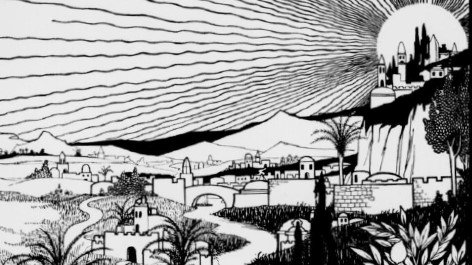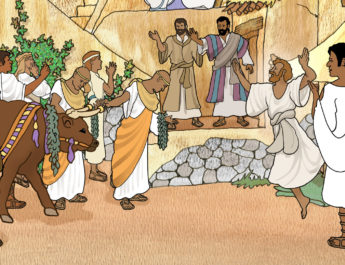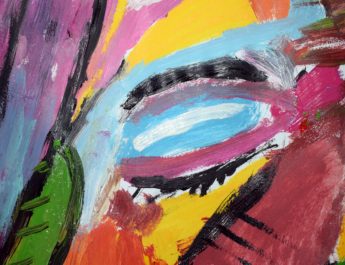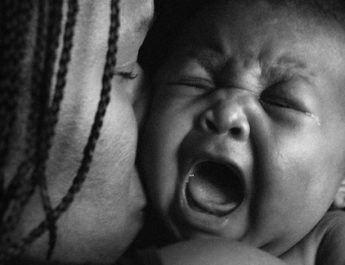Psalm 48:1-3, 9-14
A Women’s Lectionary – Presentation of the Lord
A Song.A A PsalmB of the Korahites.C
A “song” = shir. From shir (to sing; one who is singing or leading others in song). This is song or singer.
B “Psalm” = mizmor. From zamar (making music; used specially of music to worship God; music with singing, singing praise, singing psalms); may be from zamar (to trim or prune). This is a melody or a psalm.
C “Korahites” = ben + Qorach. Literally, “sons of Korah.” Ben is from banah (to build or obtain children). This is son, age, child. It is son in a literal or figurative sense. Qorach is from qarach (to shave bald, perhaps frozen). This is Korah, perhaps meaning “ice,” “frost,” “hail,” or “baldness.” See https://www.abarim-publications.com/Meaning/Korah.html
1 GreatD is the LordE and greatlyF to be praisedG
in the cityH of our God.I
D “great” = gadol. From gadal (to grow up, become great, become wealthy – to advance. The root meaning may be to twist in the sense of the process of growing). This is great, high, bigger, noble, old, marvelous. It can also refer to someone who is powerful or distinguished.
E “Lord” = YHVH. From havah (to be, become) or hayah (to come to pass, become, be). This is the name of the God of Israel, the self-existent and eternal one, the tetragrammaton. This pronunciation has been lost to time so “Lord” is generally used in its place.
F “greatly” = meod. Perhaps from the same as uwd (firebrand, a poker). This is very, greatly, exceedingly. It can also mean vehemence, force, abundance.
G “praised” = halal. This is to be clear – it originally referred to a sound, then a color. It was to shine and then make a show or boast then to rave. In a causative sense it came to mean celebrate, give glory, sing praise, or be worth of praise. Because of the celebratory nature of the word, it could also mean to give in marriage. This is where Hallelujah comes from.
H “city” = iyr. From uwr (to awaken or wake oneself up). This can mean excitement in the sense of wakefulness or city. Properly, this is a place that is guarded. Guards kept schedules according to watches. This sense of the word would include cities as well as encampments or posts that were guarded.
I “God” = Elohim.
His holyJ mountain,K 2 beautifulL in elevation,M
is the joyN of allO the earth,P
J “holy” = qodesh. This is set apart and so sacred. God is different from us and so God is holy/set apart. Things we dedicate to God’s service are set apart for God and so they, too, are holy, etc.
K “mountain” = har. From harar (hill or mountain). This is mountain, hill, hilly region.
L “beautiful” = yapheh. From yaphah (to be beautiful, decorate; root means being bright, which implies being beautiful). This is beautiful in a literal or figurative sense – appropriate, handsome, godly, pleasant.
M “elevation” = noph. 1x in OT. Perhaps from nuph (to rock back and forth, wave, sprinkle, quiver, beckon, offer, present). This is height or elevation.
N “joy” = masos. 17x in OT. From sus (to rejoice, be glad; properly, to be bright or cheerful). This is delight, joy, something that causes joy or the feeling itself.
O “all” = kol. From kalal (to complete). This is all or every.
P “earth” = erets. Root may mean to be firm. This is earth, ground, field land, or country.
MountQ Zion,R in the farS north,T
the cityU of the greatV King.W
Q “Mount” = har. Same as “mountain” in v1. See note K above.
R “Zion” = Tsiyyon. Related to tsyiyyun (signpost, monument); from tsavah (to charge someone, to command, order); from the same as tsiyyah (dryness drought); from a root meaning parched as desert, dry land. Zion can refer to a mountain in Jerusalem as well as another name for Jerusalem itself or the people.
S “far” = yerekah. From yarek (thigh, side, body, shank; can be figurative for genitalia). This is flank, side, recesses, border, quarter, extreme parts.
T “north” = tsaphon. From tsaphan (to hide, hoard, reserve; to cover over or figuratively to deny; also to lurk). This is properly hidden, dark, or gloomy. It can also be used to refer to the north.
U “city” = qiryah. From qarah (to happen, meet, bring about). This is a place where there are buildings so it could be a fortress or a town.
V “great” = rab. From rabab (increasing in any aspect whether quantity, authority, size, quality, greatness, etc.). This is abundance, many, elder, exceedingly, great. It refers to abundance of amount, rank, or status.
W “King” = melek. From malak (to be or become king or queen, to rise to the throne, to be crowned; by implication, to take counsel). This is king or royal.
3 Within its citadelsX God
has shownY himself a sure defense.Z
X “citadels” = armon. Root might mean to be high in elevation. So, this is any kind of fortified building like a citadel, castle, tower, or palace.
Y “shown” = yada. This is to know, acknowledge, advise, answer, be aware, be acquainted with. Properly, this is to figure something out by seeing. It includes ideas of observation, recognition, and care about something. It can be used causatively for instruction, designation, and punishment.
Z “sure defense” = misgab. 17x in OT. From sagab (raise, lifted, high, secure on high, excellent, strong; literal and figurative). This is a high or inaccessible location. Abstractly, it can be altitude. Concretely it is a cliff or height. Figuratively, it is a refuge or stronghold – a high fort or tower. There is also a place called Misgab in Moab.
9 We ponderAA your steadfast love,BB O God,
in the midstCC of your temple.DD
AA “ponder” = damah. This is to be like, resemble, devise. It can be to think using analogies.
BB “steadfast love” = chesed. From chasad (being good, kind, merciful; may mean bowing one’s neck as is done in the presence of an equal for courtesy’s sake; so, if one in a superior position is treating you like an equal, that is what is captured here). This is favor, goodness, kindness, loving kindness, pity, reproach, or a good deed. When done by God to humanity, this is mercy/loving kindness. When done by humanity to God, it is piety.
CC “midst” = qereb. Perhaps from qarab (to come near or approach). This is among, in the midst, before, the center It is the inward part, whether literal or figurative. It can also be used for the heart, the site of thoughts and feelings. This word is also used as a technical term for the entrails of the animals who are sacrificed.
DD “temple” = hekal. Perhaps from yakol (to be able, endure, overcome, prevail). This is a large building with public access such as a palace or temple.
10 Your name,EE O God, likeFF your praise,GG
reaches to the endsHH of the earth.
EE “name” = shem. May be from sum (to put, place, set). This is name, fame, renown. A name was thought to indicate something essential about a person – something about their individuality. So, this word can also mean honor, authority, or character.
FF “like” = ken. Perhaps from kun (properly, in a perpendicular position; literally, to establish, fix, fasten, prepare; figuratively, it is certainty, to be firm, faithfulness, render sure or prosperous). This is to set upright. Generally used figuratively to mean thus, so, afterwards, rightly so.
GG “praise” = tehillah. Related to “praised” in v1. From halal (see note G above). This is praise or a song of praise. It is to offer God a hymn, to boast in God. This shares a root with “hallelujah.”
HH “ends” = qatsu. 4x in OT. From qatsah (to cut off, cut short; figuratively, to destroy). This is an end, edge, boundary, corner, or limit. It is also used twice for the “ends of the earth.”
Your right handII is filledJJ with victory.KK
II “right hand” = yamin. May be from yamam (to go or choose the right, use the right hand; to be physically fit or firm). This can mean right hand, right side, or south. Since most people are right-handed, the metaphorical usage of this word presumes that the right hand is stronger and more agile. Thus, it is the instrument of power and action.
JJ “filled” = male. This is fill, satisfy, replenish, accomplish, fulfill, confirm, or consecrate. It is fill in a literal or figurative sense.
KK “victory” = tsedeq. This is rightness, righteousness, vindication. It is everything that is just or ethical. That which is right in a natural, moral, or legal sense. It also includes just weights (i.e. true weights). Figuratively, this is justice, righteousness, equity – even prosperity.
11 Let Mount Zion be glad,LL
let the townsMM of JudahNN rejoiceOO
because of your judgments.PP
LL “be glad” = samach. This is to rejoice or be glad. Properly, it is to brighten up in a literal or figurative sense.
MM “towns” = bat. Related to “Korahites” in superscript. From ben (see note C above). This is daughter in a literal or figurative sense.
NN “Judah” = Yehudah. Probably from yadah (to throw one’s hands into the air in a gesture of praise); from yad (hand). This is Judah, meaning “praised.”
OO “rejoice” = gil. Properly, this is twirling around because of a strong feeling whether of rejoicing or from fear. This can be rejoice, be glad or joyful, or to cry.
PP “judgements” = mishpat. From shaphat (to judge, defend, pronounce judgment, condemn, govern). This is a verdict or formal sentence whether from humans or from God. It includes the act of judging as well as the place that judging takes place, the suit itself, and the penalty. Abstractly, this is justice, which includes the rights of the participants.
12 Walk aboutQQ Zion, go all aroundRR it,
countSS its towers,TT
QQ “walk about” = sabab. This is turning around, going around; to surround, cast, walk, fetch. It is to revolve or border in a literal or figurative sense.
RR “go all around” = naqaph. 19x in OT. This is to strike, cut down, surround, destroy, corrode, knock together, or enclose. It can be to surround as a guard or like the sea. It can meaning coming to the end of a festival time or enclosing in a net or trap.
SS “count” = saphar. From sepher (writing, document, book, evidence). This is properly to tally or record something. It can be enumerate, recount, number, celebrate, or declare.
TT “towers” = migdal. Related to “great” in v1. From gadal (see note D above). This is a tower, podium, bed of flowers. This is perhaps the root of “Magdalene.”
13 consider wellUU, VV its ramparts;WW
go throughXX its citadels,
that you may tellYY the nextZZ generationAAA
#vUU “consider well” = shith. This is to place, set, bring, appoint, consider, bring, array or look.
VV {untranslated} = leb. May be related to labab (to encourage; properly, to be encased as with fat; used in a good sense, this means to transport someone with love; used in a bad sense, it can mean to dull one’s senses). This is the heart, courage, one’s inner self, the mind, or the will. Heart is only used in a figurative sense in the Old and New Testaments.
WW “ramparts” = cheylah. 1x in OT. From chayil (strength, wealth, ability, activity; a soldier or a company of soldiers; goods; a force of people, means, or goods; valor, virtue, or strength); from chul (whirling around so dancing as in a circle or writhing in pain; used particularly for the pain of childbirth or from writhing due to fear; can also be falling in pain or waiting). This is bulwark or entrenchment.
XX “go through” = pasag. 1x in OT. This is to pass through or figuratively to contemplate.
YY “tell” = saphar. Same as “count” in v12. See note SS above.
ZZ “next” = acharon. From achar (to be behind, delay, be late, procrastinate, continue). This is end, last, coming behind, to loiter, later. It can also refer to the west.
AAA “generation” = dor. From dur (to move in a circle, which implies living somewhere or remaining there; it can also be the sense of piling or heaping up). This is a revolution of time, which is to say, an age or generation. It can also be a dwelling or one’s posterity.
14 that this is God,
our God foreverBBB and ever.CCC
He will be our guideDDD forever.EEE
BBB “forever” = olam. This is a long scope of time whether in the past (antiquity, ancient time) or in the future (eternal, everlasting).
CCC “ever” = ad. From adah (to advance or continue; to take away or remove; adorning oneself with ornaments). This is old, perpetuity, eternity. It is a duration going back or forward.
DDD “be…guide” = nahag. This is to drive as in driving flocks, but also driving in animal or vehicle like a chariot. It can mean to carry away, lead, drive away, proceed, or guide. It can also relate to behavior and what one is accustomed to.
EEE “forever” = al + muth. Literally, “to death.” Muth is 2x in OT. From mut (to die in a literal or figurative sense; a dead body). This is death or a song title Muth Labben.
Image credit: “Illustration by Lilien (1874-1925) of the book (1903): Lieder des Ghetto of Morris Rosenfeld; translation from yiddish to german by Berthold Feiwel”




